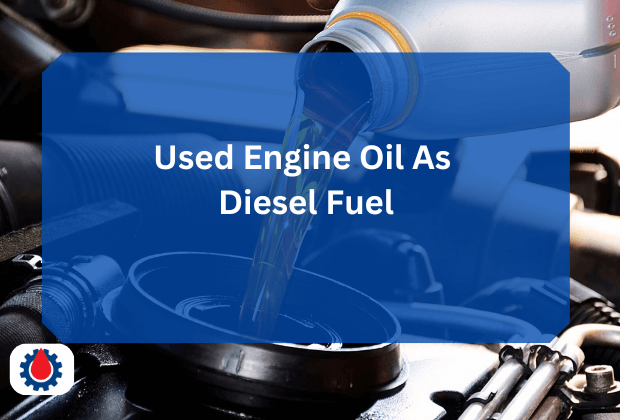In this post, we explore the process, potential benefits, and significant risks involved in using used engine oil as diesel fuel.
Used Engine Oil As Diesel Fuel
No, it is not advisable. While used engine oil contains residual energy and can technically be filtered and blended for use as fuel, it poses serious risks to engines, the environment, and legality. Contaminants like heavy metals, carbon deposits, and acids can damage fuel systems, cause incomplete combustion, and increase emissions.
Most modern engines are not designed to handle such impurities, and using waste oil as fuel without proper treatment or permits is often illegal. It’s safer and more responsible to recycle used oil through certified channels.
Related Can You Mix Engine Oil Brands(Read This Before Mixing Oil)
Risks and Downsides of Using Used Oil as Diesel Fuel
While the idea may sound promising, there are serious risks involved:
1. Engine Damage
Used oil contains abrasive materials and chemical contaminants. Even after filtering, these can damage:
- Fuel injectors
- Pistons and cylinder walls
- Turbochargers
- Emission control systems (like EGR and DPF)
2. Incomplete Combustion
Used oil doesn’t burn as cleanly or efficiently as diesel. It may lead to:
- Carbon buildup
- Smoke emissions
- Engine knocking
3. Legal and Environmental Issues
In many countries, burning waste oil is regulated or outright illegal due to toxic emissions (heavy metals, dioxins, etc.). Using waste oil as fuel without proper permits or equipment may result in:
- Fines or legal action
- Environmental contamination
- Health risks to operators and communities
4. Incompatibility with Modern Engines
Modern diesel engines, especially those with high-pressure common rail fuel systems, are highly sensitive to fuel quality. Even minor impurities can lead to expensive repairs or total engine failure.
Related Diesel Engine Oil Additives(Benefits & Top Oil Additives)
Why Consider Used Engine Oil as Fuel?
There are several motivations behind the idea of using waste engine oil as an alternative fuel:
- Cost Savings: Diesel fuel is expensive, especially for individuals or businesses operating heavy machinery or vehicle fleets. Reusing waste oil could reduce fuel expenses.
- Waste Reduction: Improper disposal of used motor oil is harmful to the environment. Reusing it can help prevent pollution and reduce landfill waste.
- Energy Recovery: Used engine oil retains some of its original energy content. Rather than wasting it, some see an opportunity to recover that energy.
- Off-grid or Emergency Use: In remote areas or during fuel shortages, having a backup fuel source can be valuable.
Related White Stains Engine Splatter After Oil Change(4 Causes + Solutions)
How Used Engine Oil Is Turned into Fuel
Used engine oil cannot be poured directly into a diesel engine without causing serious damage. To be usable as a diesel alternative, it must first be filtered, treated, and sometimes blended with diesel or other fuels. Here are the common methods:
1. Filtering and De-watering
This is the most basic process, which involves:
- Removing water (through heating or settling)
- Filtering out solid contaminants (metal shavings, soot, etc.)
However, simple filtering doesn’t remove heavy metals, acidic compounds, or chemical byproducts, which can harm engines over time.
2. Blending with Diesel
Some users blend small amounts (e.g., 10-20%) of cleaned used motor oil with diesel fuel. This dilutes the contaminants and helps maintain combustion quality. However, this still poses risks, especially for modern engines with strict fuel system tolerances.
3. Distillation
More advanced systems use pyrolysis or distillation to extract usable fuel from waste oil. This method heats the oil in a low-oxygen environment to separate it into different fractions, similar to how crude oil is refined. The resulting product can be closer to diesel in composition.
Related Diesel Engine Oil Temperature Chart(Comprehensive Guide)
When Is It Safe (or Legal) to Use?
Used engine oil can be burned safely and legally only under specific conditions:
- In waste oil burners or heaters are designed to handle contaminants.
- After thorough processing via certified equipment.
- With permits and in compliance with local environmental regulations.
In industrial settings, waste oil can be a valuable energy source when handled responsibly. However, for private vehicles or farm equipment, the risks usually outweigh the benefits.
Alternatives to Burning Used Engine Oil
Instead of using it as fuel, consider these environmentally responsible options:
- Re-refining: Some facilities re-refine used oil into new lubricating oil.
- Proper recycling: Many auto shops and recycling centers accept used oil for safe disposal.
- Industrial use: Factories and power plants may use it as a fuel under strict controls.
Related Diesel Engine Oil Grades Chart(Ultimate Guide)
FAQs
Can you use used engine oil as diesel fuel?
Technically, yes, but it is not recommended. Used engine oil must be thoroughly filtered and processed before limited use, and even then, it can damage engines and is often illegal due to toxic emissions.
What happens if you put engine oil in diesel?
Mixing engine oil with diesel can lead to clogged injectors, poor combustion, increased smoke, and long-term engine damage. Modern diesel engines are highly sensitive to fuel quality.
Can used engine oil be used as fuel?
Yes, but only in specialized systems like waste oil burners or after advanced processing such as distillation. Direct use in engines is risky and usually not permitted without proper treatment.
Can you make diesel fuel from oil?
Yes, diesel can be produced from various oils through processes like pyrolysis or transesterification (for biodiesel). However, used engine oil requires complex refining to become a safe fuel.
Is it good to mix engine oil with diesel?
No, it is not recommended. Even small amounts of engine oil in diesel can harm engine performance and emissions systems, especially in modern vehicles.
Can you burn used motor oil in a diesel engine?
Only under controlled conditions. Burning used oil directly in a diesel engine is unsafe and illegal in many places due to pollutants. It requires special processing and equipment.
Final words
While used engine oil as diesel fuel may seem like a clever workaround, it’s far from a straightforward or risk-free solution. Although the concept holds promise in controlled industrial environments, using waste oil in standard diesel engines is not advisable due to the high risk of engine damage, legal issues, and environmental harm.




